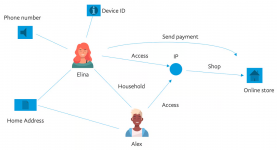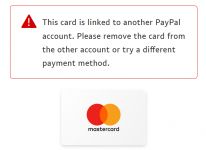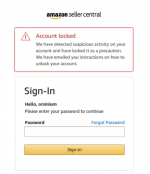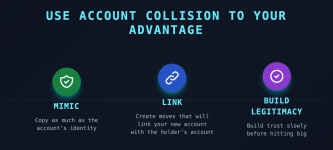d0ctrine
Diamond
- Joined
- 17.08.24
- Messages
- 107
- Reaction score
- 4,227
- Points
- 93

One extremely important thing that rarely gets talked about regarding carding is the concept of account collision. Picture this: Youve got a fresh CC ready to go youre about to hit that checkout button but BAM - the site tells you this card is already linked to another account. What the fuck just happened?
Account collision isnt just some minor inconvenience - its a possible roadblock that can completely derail your operation and potentially expose your ass. When a card youre trying to use already has an existing account on the target site youre not just dealing with basic fraud detection anymore - youre playing a game with an AI which has the owners profile on their side.
In this guide were diving deep into the concept of account collision - what causes it why it matters and most importantly how to avoid having your entire operation blow up in your face.
What is Account Collision?
Account collision occurs when you attempt to use a card on a site where the actual cardholder already has an existing account. This shit is especially prevalent on major platforms like Amazon Walmart or any other massive site the holder of your card already uses.Heres why this is such a massive fucking problem: When you hit account collision youre not just dealing with standard fraud detection anymore. The site now has a legitimate profile to compare your sketchy ass against. Every single aspect of your session - your device fingerprint location browsing patterns shipping address - gets measured against the cardholders established behavior patterns while they use their own account.
Think about it: If someones been ordering from Amazon for 5 years straight from Chicago always shipping to the same address with a Macbook and suddenly 'they' try to order a PS5 to ship to Miami with a Windows device... well thats gonna raise more red flags than a communist parade.
The real bitch of it is that account collision fundamentally changes the entire fraud detection flow:
- Without collision: The AI only has to assess if your current session looks legitimate
- With collision: The AI compares your session against months to years of the cardholders accounts actual behavior
But not all is lost - account collision isnt always your enemy. In fact with the right approach you can weaponize this shit in your favor. Heres the beautiful fucking irony: legitimate customers are messy as hell with their accounts.
Think about it: How many times has your technologically-challenged aunt created new accounts because she 'forgot her password'? Or your paranoid uncle who makes separate accounts for his ahem 'special purchases'?
Legitimate customers create multiple accounts for all sorts of reasons:
- Forgot password fuck it new account time
- Business separation from personal purchases
- Different emails for different purposes
- Gift shopping they dont want in their main history

- Pure laziness or confusion
This chaos creates a perfect trick for your operation.
Exploiting the Gap
The real magic here isnt about memorizing some rigid playbook - its about understanding the core philosophy and applying it creatively. Lets break down how this mindset works with some real-world examples thatll make this shit crystal clear.
P.S. Make sure youve got a fresh card with all the juicy details - full info user-agent IP email before you even hit a checkout. The more info you got the better your chances.
PayPal
First step is checking if that emails already in PayPals system. Try signing up with it - if PayPal hits you with 'account already exists' congratulations youve just confirmed your cardholders got an account.
Now some smartass is gonna say 'But d0ctrine having a PayPal account doesnt mean the cards linked to it!' Heres the brutal truth: it doesnt fucking matter. Even if theyve only used that card once for a guest checkout them having an account means PayPals clustering algorithms have already tied that shit together with their identity in their backend.
So what does that mean for you? It means in order to use the card with PayPal you must for all intents and purposes perfectly mimic the user as much as you possibly can. If you read my log guide youd have a grasp of this by now:
- User-agent copying and system matching
- Residential proxies with matching ASN
- Email verification and SMS bombing
Amazon
Amazons another perfect fucking example of account collision in action. Most people and their grandmother already have an Amazon account - which means if youre trying to card a big purchase with a fresh account using their card youre gonna crash and burn fast.
The solution? Just like with PayPal you need to become a digital doppelganger of your cardholder. But with Amazon you can go even further to make your shit sweeter.
Before you even think about that big purchase start small. Buy a few gift cards and send them directly to the cardholders email (after confirming theyve got an Amazon account obviously). This sneaky little move essentially links your account with their account in Amazons backend systems.
Why does this work? Because Amazons AI sees these gift card transactions as a legitimate connection between accounts. Think about it - people often buy gift cards for family members friends or even themselves. By mimicking this behavior youre teaching Amazons algorithms that theres a 'trusted relationship' between these accounts.
The beauty of this approach is that it:
- Creates a legitimate connection
- Builds transaction history
- Makes larger purchases look natural
- Exploits customer behavior patterns
Remember though: This isnt a fucking guarantee. You still need to nail all the basics - matching device fingerprints proper IP configuration and maintaining consistent session patterns. The gift card trick just adds another layer of legitimacy to your newly created account.
Conclusion
PayPal and Amazon are just scratching the surface of this shit. This same philosophy applies across pretty much every major platform and banks where your mark might have an existing account - from Apple, Zelle to BOA and everything in between.
Think about it: Any service that handles financial transactions is going to have sophisticated fraud detection systems looking for account collisions. The bigger the platform the more data points theyre tracking and the more important it becomes to mirror your holders digital footprint perfectly.
Remember this shit isnt some magic 'one weird trick' that scammers try to sell you in their Telegram groups. This is about understanding how modern fraud detection actually works and adapting your approach accordingly. Every major platform out there is using sophisticated clustering algorithms to connect identities - and if youre not accounting for that youre just throwing money and time away.
When youre analyzing a new target site the first question you should ask yourself is: 'How fucking likely is it that my mark already has an account here?' If its a major platform - especially anything financial or e-commerce related - the answer is probably 'very fucking likely.' That means you need to factor account collision into your strategy from day one.
The difference between success and failure often comes down to understanding these underlying mechanics. Stop chasing bullshit 'methods' and start thinking about how these systems actually work. Thats what separates the script kiddies from the professionals who actually make consistent money in this game.
Now get out there and start thinking like the systems youre trying to beat. And remember - if youre not learning the concepts that matter youre already fucked before you even start. d0ctrine out.







